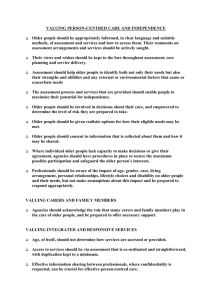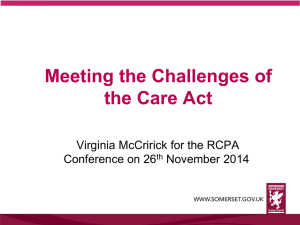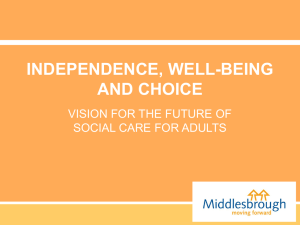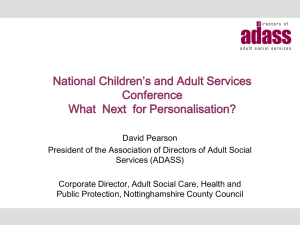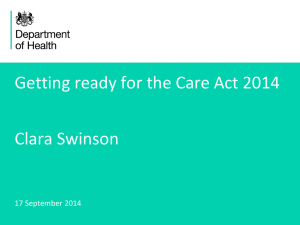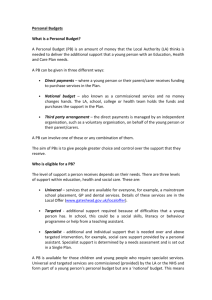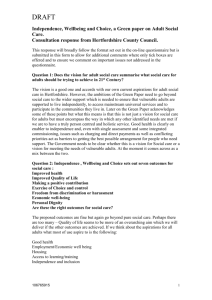Messages from the Green Paper
advertisement
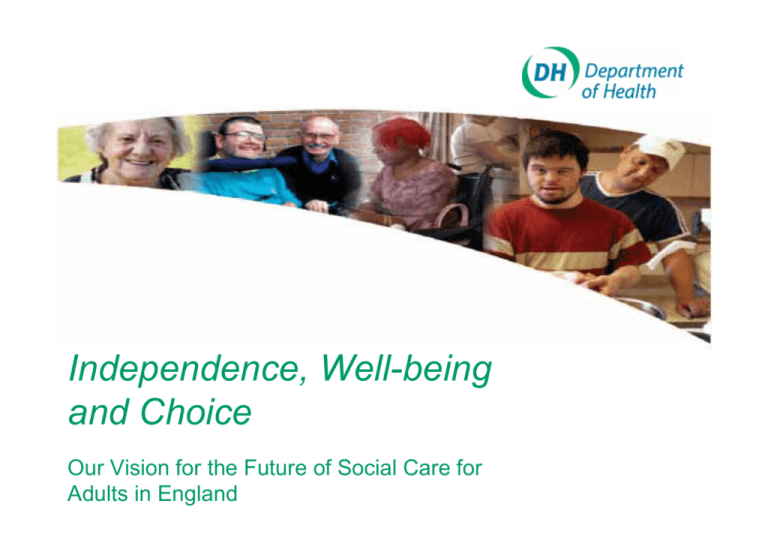
Independence, Well-being and Choice Our Vision for the Future of Social Care for Adults in England Background • New vision for adult social care announced by Stephen Ladyman in April 2004 • Services should be person-centred, pro-active and seamless • On-line survey hosted by the Social Care Institute for Excellence (SCIE) website • Extensive stakeholder involvement including people who use services and their carers Cross-government links • Prime Minister’s Strategy Unit report, Life Chances of Disabled People, January 2005 • The future of local government: developing a 10 year vision, ODPM 2004 • National Service Frameworks • Valuing People White Paper • NHS Improvement Plan • Choosing Health public health White Paper Green Paper contents • A vision for adult social care in the next 10-15 years • How to put people in control of their lives • How the right environment for change might be achieved The Vision We want people who use social care to have – more control – more choices and help to decide how their needs can best be met – the chance to do the things that other people take for granted and have better access to universal services – the best quality support and protection for those with the highest levels of need. Why do we need a new vision? • Most of us give and receive informal care when it is needed. but sometimes our needs are beyond what can be supported in this way and additional social care is required. • We need to look again at organised social care because of – Changes in population – Changes in communities – Changing expectations • It is no longer acceptable to continue to deliver social care in the way we do today. Setting clear outcomes for social care • • • • • • • Improved health Improved quality of life Making a positive contribution Exercise of choice and control Freedom from discrimination or harassment Economic well-being Personal dignity Managing risks • Levels and types of risk vary at different times in people’s lives • Social care retains a responsibility of the protection of individuals • Balance between enabling people to have control over their lives and ensuring they are safe • We want an open debate about this Putting individuals at the centre of assessment • • • • • • Allow people to take more responsibility, and free up social workers to use their skills for those who need greatest support. Challenge the approach that services offered are those that are available and not what people want Self-assessment for simpler cases of need One common assessment tools for all people with complex needs ? Streamlined assessment across agencies, particularly between local authorities, health agencies and the Department for Work and Pensions. Better Information Giving people the means to choose their services: direct payments • direct payments give people choice and control, but take-up is disappointing • extend direct payments to those currently excluded, by using an agent for those without the capacity to consent, or unable to manage even with assistance Individual budgets (1) • • • individual budget would reflect the cost of implementing the agreed needs assessment notional and held by the local authority on behalf of the person using services or their carer offers the real benefit of choice and control of direct payments, without the burdens which they sometimes impose Support for individuals (models) • • • • person-centred planning facilitator care manager care navigator care broker The role of carers • Carers provide a vital role, not only to those they care for, but to society as a whole • They too need support and services • They would like access to training and support in their caring role • This should form part of any local workforce development initiative • Principle of putting people in control applies equally to carers Preventative services • Greater focus on preventative services through – the wider well-being agenda – access to universal services e.g. housing, leisure, community safety – better targeted early interventions – Measures recommended in Choosing Health • This approach will prevent or defer the need for more costly intensive support. • Shifting the balance of services will have implications for existing eligibility criteria where these apply Funding • • • • • Some resources tied up in unnecessary assessments or services that may no longer best meet the needs and requirements of people using services Improved access to universal services can reduce the need for social care Scope for making better use of funding, e.g. pooled budgets Gershon review target efficiency saving of 2.5% across local government services. Care services efficiency programme The strategic and leadership role played by Local Government • To effect change, high-quality leadership is essential at both officer and member levels • Role of Director of Adult Social Services • Support and develop market capacity and commission services more strategically • Develop strategic partnerships • Regular strategic needs assessments • Developing the well being agenda Partnership working (1) • Local partners will need to work together to promote and ensure a strategic balance of investment in local services – Community development – Shift to prevention, enablement and early intervention services – Support and care services – Improving integrated partnership working – a range of models – NHS will remain the key partner – Difference model, to suit local circumstances – Collaborative commissioning Service improvement and delivery • Models – Extra care housing – Homeshare – Adult placement – Technology-enabled services – Connected care centres • Improved transition planning from child to adult • Care Services Improvement Regulation and performance assessment • Existing inspection and performance assessment frameworks to be modernised • Establish well-being targets • Performance indicators that reflect agreed outcomes • Local Strategic Partnerships’ role in cross-cutting issues Social care workforce • • • • Service is only as good as the person delivering it Social care workforce undervalued Support improved leadership Recruitment and retention - ‘whole system’ staff care policies • Training strategy – Skills for Care review What happens now? • Consultation closed on 28 July 2005 • Analysis of results by mid September • Integration with new White Paper on out of hospital care – more on that later • Call for expressions of interest in Individual Budget pilots • Pilots due to begin by end 2005 Preliminary Results • The early indications from the “professional” audience are of consensus about the overall direction of travel • Strong support for the vision set out in the Green Paper and endorsement of the outcome based approach. • Enthusiasm for the person-centred approach and empowering people to take control of their lives through the introduction of individual budgets and the extension of direct payments But….. • • • • No consensus that the outcomes can be achieved from within existing resources Gains in efficiency could be achieved through more robust partnership working and shifting to more preventative working (but only if resources can be shifted from acute care) The continuation of faultlines between health and social care can make the desired outcomes more difficult to achieve (eg continuing care; direct payments that cannot be transferred to health services) And these faultlines extend to other areas eg housing and the benefits system which are the responsibility of other government departments. A sense that the Green Paper was a “missed opportunity” to do something about this. The current performance frameworks are a barrier to joined up working and the development of outcome based targets. There is a call for common performance frameworks and regulation/inspection.
